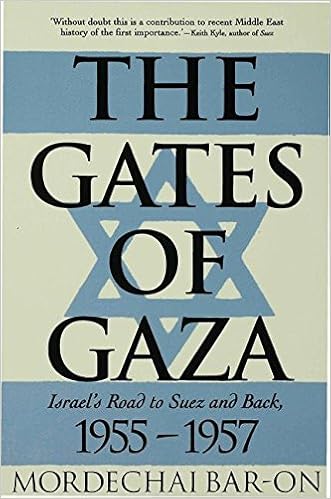
This is a very important book for all readers looking to understand this war. While this work is not a definitive book over this war because of its Israeli-centric focus, it is still vitally important to understanding that Israeli perspective. This book is an in depth look from the Israeli perspective of the political and military lead up to the Sinai campaign into the actual campaign and into the aftermath.
One of the main things I took from this work though was the failure of intelligence during the Cold War years to see the world in anything beyond polar extremes. This goes for Western powers such as the US as much as it does for Israel. The US and Western powers failed to understand that people like Nasser might actually be playing both sides for their own political gains. Instead the quest for third world domination became a zero sum game in which all was either lost or won. As for Israel it was simply not even considered that the Egyptian arms deals could have any other purpose other than the annihilation of the Israeli state. No one even considered that Egypt may be playing a different game with different motivations. Of course Israel can be forgiven this failure a little more readily since they had much more to lose than the US for instance, but it is still remarkable.
This failure of the West to understand the regional dynamics at play around the world no doubt helped push this war. The failure to understand the very real fears of the Israeli state and to recognize their need for security left Israel with very few good options, and it meant that Israel was in a position to where they would accept any help they could find. Of course this also exposes the failure of Nasser as well. His attempts at backdoor diplomacy could never assuage the fears of the Israelis while his rhetoric for the masses was geared towards the destruction of Israel. Nasser attempted to use Israel as a whipping boy so he could garner more Arab support for his pan-Arab world vision, but as Israel has demonstrated in the past Israel is a whipping boy that hits back.
Another important aspect of this book is that the author does a very good job detailing the atmosphere that surrounded the Suez war. This is crucial because one needs to remember that Israel was still a fledgling state at this point less than a decade old. As we look at Israel of today our historical perspective can be skewed by the power and stability that Israel now evinces, and so we must remember to see the situation within its proper historical perspective which the author makes sure to reproduce for readers in this book. The fear of total destruction was palpable and real.
Before I conclude I did have some problems with this book as well, and I will describe these quickly here. A major problem I had was the author discusses the level of fear in the Israeli population as well as the leadership, but the author offers the readers no discussion or analysis on the relationship between the two. Did the population help inspire the fear in the leadership or was it the other way around? A question of which came first the chicken or the egg so to speak. The author simply says that the fear existed, but doesn't analyze that fear further to see if the leadership helped engender that fear to pursue their own agenda, or did the populations fear push the leadership into directions it might not have taken under more rational consideration?
The author says that the accepted orthodoxy of the intelligence community was that Egypt would absorb the new armaments within six months, and even be ready to move into offensive operations against Israel in that time, but there is no discussion about where this estimate came from, or whether there were any dissenting views from this estimate. Simply looking at the quality of the Egyptian army at the time the six month estimation seems extremely quick, but the author does not discuss how this estimate came about.
I was hoping to see a little bit more in the way of analysis of failures and successes from the diplomatic and military side of this conflict, but the author really only lays out the history without any in depth analysis of his own. This isn't a major problem, and often I applaud historians who simply attempt to lay out the history without injecting it with their ideas, but here this author was uniquely qualified to offer readers an important analysis. I was hoping to get a little more of his professional opinion with nearly four decades to reflect and refine his understanding of these events he was intimately involved with.
All in all this is a powerful work that has greatly enhanced my understanding of the events surrounding this conflict. While I did have a few problems here and there, they did not detract from this book very much at all. As I said before this is not the definitive book on this war, but I don't think any reader can have a complete understanding of these events without reading Mordechai Bar-On's The Gates of Gaza. I highly recommend this book.
No comments:
Post a Comment